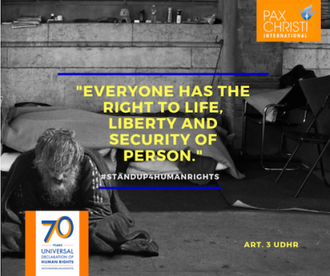Pax Christi International on 70th anniversary of Universal Declaration on Human Rights

Below is the statement from Pax Christi International issued on the 70th anniversary of the Universal Declaration of Human Rights.
Today marks the 70th anniversary of the Universal Declaration on Human Rights (UDHR), which was adopted by the UN General Assembly on 10 December 1948. A milestone document, it enumerated, for the first time, a universal core of human rights that, as agreed upon, guaranteed the fundamental rights of every individual. The declaration is an essential component to our present-day foundation of human rights protection. (1) For 70 years, the UNDR has served as a roadmap for the advancement of human rights around the world.
The promotion and the protection of human rights, such as those recognised in the UDHR, are at the very heart of Pax Christi International's work as a global peace and nonviolence movement. Through activities grounded in the belief of the power of nonviolence, our member organisations and partners educate people and communities about their human rights, promote services to ensure that their human rights will be met, and cooperate with-as well as pressure-decision-makers to respect and advance human rights through their actions. The UDHR has truly served as a catalyst for human rights advancement at the local, national, regional and international level benefiting many of the people and communities with whom we work.
Pax Christi International believes that this anniversary should serve not only as a moment to celebrate the achievements of the UDHR but also as a pivotal time to examine the current challenges for its implementation. We have become acutely aware from our partners and friends that human rights and those who seek to protect them are increasingly under attack. The tireless guardians of these universal rights are faced with a shrinking space in which to do their work. Yet despite these challenges, we remain hopeful because human rights defenders, environmental and disarmament activists remain steadfast in their nonviolent struggle for human rights.
End violence and violent conflicts to stop human rights violations
One of the major challenges to the implementation of the UDHR is the impact of violence and violent conflicts on the human rights of millions of people around the world. It is troubling that for the first time since the end of the Cold War, violence and violent conflict have increased due to inter- and intrastate tensions. (2) The most violent conflicts of the last years, such as in Syria, Iraq, Yemen, Sudan, Congo, the Philippines and Mexico, have witnessed large scale human rights abuses as well as violations of international humanitarian and criminal law. These actions have had an especially devastating effect on vulnerable groups such as women, children and disabled persons.
Particular attention needs to be given to the long-standing Israeli-Palestinian conflict. The ongoing violence over 70 years of conflict and 51 years of military occupation has resulted in the violation of human rights of women, men and children. To ensure that the rights as articulated in the UDHR are realised for all, the international community must remain vigilant, unbiased and thorough in their fact-finding and demand accountability for all violations of international law. It is equally important that they defend and protect human rights activists and safeguard the rights of their own citizens to free speech and the use of nonviolent strategies toward this goal.
Eliminate nuclear weapons on the basis of human rights
As recognised in the Treaty on the Prohibition of Nuclear Weapons, which was adopted at the United Nations on 7 July 2017, human rights are closely intertwined with nuclear disarmament. (3) Of specific relevance regarding nuclear weapons are the rights stipulated in the UDHR to life, to humane treatment, to health and to effective remedy. It is also necessary to identify and examine human rights violations which may occur in the pursuit of nuclear weapons. For example, uranium mining and processing have been shown to cause grave health and environmental risks. And, as nuclear tests are invariably carried out and countries must secure storage of their radioactive waste (required for thousands of years), the potential for ongoing human rights violations is significant.
The Treaty on the Prohibition of Nuclear Weapons currently has 69 signatories and 19 states parties. Once 50 nations have ratified or acceded to it, it will enter into force. It is thus crucial that UN member states proceed swiftly with the signing and ratification of the treaty, also considering the value of its human rights provisions. The international community should urge states during the Universal Periodic Reviews at the UN Human Rights Council to join the treaty. Once the treaty enters into force, it can be used to gather evidence on how the human rights provisions, such as those related to the UDHR, are being fulfilled or violated.
Demand safeguards for human rights in extractive activities
Globally, many people's human rights are violated daily by the activities of companies exploiting natural resources, such as oil, gas, gold, silver, iron, copper and tin, as well as by other large-scale development projects. To illustrate, our Latin American member organisations and partners cite numerous examples of such violations: communities whose health and well-being are negatively affected by the contamination of their environment; individuals who are threatened or criminalised for speaking up; and the lack of access to effective remedies. All these realities violate their human rights as stipulated in the UDHR and other human rights instruments.
Full support should be given to local communities impacted by extractive projects by listening and respecting their opinions, making available human rights and nonviolence trainings, and implementing measures for their protection. The international community should strongly advocate for legislation and policies which would ensure that governments and extractive companies are transparent and accountable in cases of violations of human rights. It is crucial for communities to have access to courts and complaint mechanisms-a necessary step in accessing an effective remedy, a core right under the UDHR. All efforts must be made to have these stipulations strongly secured in the currently negotiated UN Binding Treaty on Business and Human Rights.
Support civil society in their nonviolence work for human rights
This year we are also commemorating the 20th anniversary of the UN Declaration on Human Rights Defenders, adopted by the General Assembly in 1998 on the occasion of the 50th anniversary of the UDHR. The urgency to reflect on both these documents could not be greater. As attacks on human rights defenders reach unprecedented levels, it is critical that special attention be given to their important work and the dangerous situations in which they often find themselves. In 2017 alone, over 300 human rights defenders across 27 countries were killed-double the numbers from 2015. (4) These statistics indicate that we are fast approaching a crisis across the globe that must be addressed for the safety and well-being of us all.
The shrinking space for human rights defenders, many of whom are colleagues and friends striving for the protection of human rights through nonviolent approaches, is alarming. They receive threats jeopardising their personal safety; they risk arrest and detention; their work is severely hampered by restrictive laws and funding cuts. At this perilous moment, the international community must step up their financial and political support to human rights defenders, their communities and organisations. It is only with the united commitment of the global community that their nonviolence work in pursuit of respect for human rights will be emboldened to resist powerful forces, including armed groups, repressive governments, and exploitive corporations.
Sustainable Development Goals (SDGs) and ongoing work
The 2030 Agenda for Sustainable Development is firmly rooted in advancing universally recognised human rights as outlined in the UDHR. It offers the international community a blueprint to make further advances necessary for all people to enjoy their full potential and the exercise of their human rights. The targets, identified to achieve the SDGs by 2030, are closely aligned to the full expression of human rights. We must harness the energy of this moment to secure and expand resources and actions for human rights, so that the common values agreed upon in the UDHR can be upheld and thereby create more peaceful societies.
Over the last 70 years, the UDHR has been a great source of inspiration for the nonviolence work of Pax Christi International and it will continue to motivate the movement in its work to expand the understanding and protection of human rights around the world. The UDHR has been a landmark manifesto for the worldwide progress of human rights. However, as the human rights challenges outlined above show, there is still a great deal of work to do. Clearly the articulation and protection of human rights is as important now as when the UDHR was adopted.
Brussels, 10 December 2018
Notes
1. The declaration together with the International Covenant on Civil and Political Rights (ICCPR) and the International Covenant on Economic, Social and Cultural Rights (ICESCR), adopted in 1966, constitutes the International Bill of Human Rights. This set of human rights has further been developed in subsequent international treaties, regional instruments, national constitutions, other laws and jurisprudence.
2. OECD, "2016 States of Fragility Report", online available at: www.oecd.org/dac/conflict-fragility-resilience/listofstateoffragi....
3. See text of the Treaty which can be consulted on the website of International Campaign to Abolish Nuclear Weapons (ICAN), of which Pax Christi International is a member: www.icanw.org/the-treaty/.
4. Frontline Defenders, "Annual Report on Human Rights Defenders at Risk in 2017", 22 January 2018, online available at: www.frontlinedefenders.org/en/resource-publication/annual-report...















